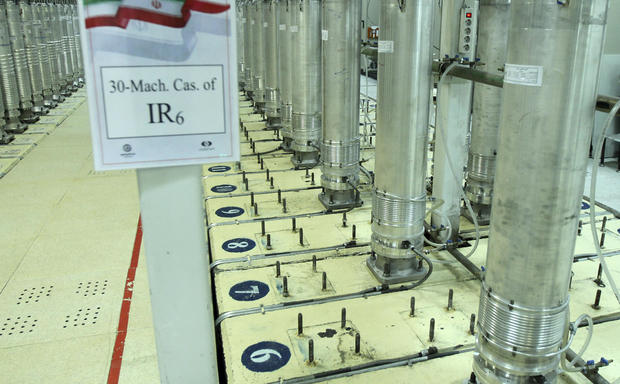
Iran to “substantially increase” uranium enrichment capacity over IAEA rebuke led by U.S. and allies
Tehran — Iran said Friday it would launch a series of “new and advanced” centrifuges in response to a resolution adopted by the United Nations nuclear watchdog that censures Tehran for what the agency called lack of cooperation. The censure motion brought by Britain, France, Germany, and the United States at the 35-nation board of the International Atomic Energy Agency (IAEA) follows a similar one in June.
It came as tensions run high over Iran’s atomic program, with critics fearing that Tehran is attempting to develop a nuclear weapon — a claim the Islamic Republic has repeatedly denied.
Iran says it will “substantially increase” uranium enrichment capacity
The resolution — which China, Russia and Burkina Faso voted against — carried with 19 votes in favor, 12 abstentions and Venezuela not participating, two diplomats told AFP.
sensitive stock of near weapons-grade uranium enriched up to 60% purity.
“Iran did not start the cycle of provocation — the Western side could, without passing a resolution… create the atmosphere for negotiations if it really was after talks,” the analyst Mohammadi said.
The 2015 nuclear deal and how we got here
In 2015, Iran and world powers reached an agreement that saw the easing of international sanctions on Tehran in exchange for curbs on its nuclear program. But the United States unilaterally withdrew from the accord in 2018 under then-president Donald Trump and reimposed biting economic sanctions, which prompted Iran to begin rolling back on its own commitments.
President Biden sought to revive parts of the deal during his first two years in office but was unsuccessful.
Without offering any specific evidence for his assertion, U.S. House Intelligence Committee chairman Rep. Mike Turner claimed in an August interview on CBS News’ “Face the Nation” that Iran could declare itself a nuclear weapons state “by the end of the year,” blaming the Biden administration for what would mark a major escalation the U.S. has sought for years to avoid.
Rep. Mike Turner says Iran could “declare itself a nuclear weapons state” by end of 2024
07:41
Iran “might declare themselves a nuclear weapons state by the end of this year, with the reports have been — news reports have been out, stating that there is a possibility,” Turner told Face the Nation moderator Margaret Brennan.
Pressed by Brennan about whether U.S. intelligence believed Iran’s Supreme Leader Ayatollah Ali Khamenei had already decided, after many years insisting his country would not seek to develop a nuclear weapon, to change that policy, Turner answered: “No.”
On Thursday, Iran’s deputy foreign minister for legal and international affairs Kazem Gharibabadi warned of Iran’s potential next step.
“Iran had announced in an official letter to European countries that it would withdraw from the NPT if the snapback mechanism was activated, and the Security Council sanctions were reinstated,” Gharibabadi said in a late-night interview with state TV.
The 2015 deal contains a “snapback” mechanism that can be triggered in case of “significant non-performance” of commitments by Iran.
This would allow many sanctions to be reimposed.
Tehran has since 2021 decreased its cooperation with the agency by deactivating surveillance devices monitoring the nuclear programme and barring UN inspectors.
At the same time, it has ramped up its nuclear activities, including by increasing its stockpiles of enriched uranium and the level of enrichment to 60%.
That level is close, according to the IAEA, to the 90%-plus threshold required for a nuclear warhead and substantially higher than the 3.67% limit it agreed to in 2015.
More
More
Source: cbsnews.com